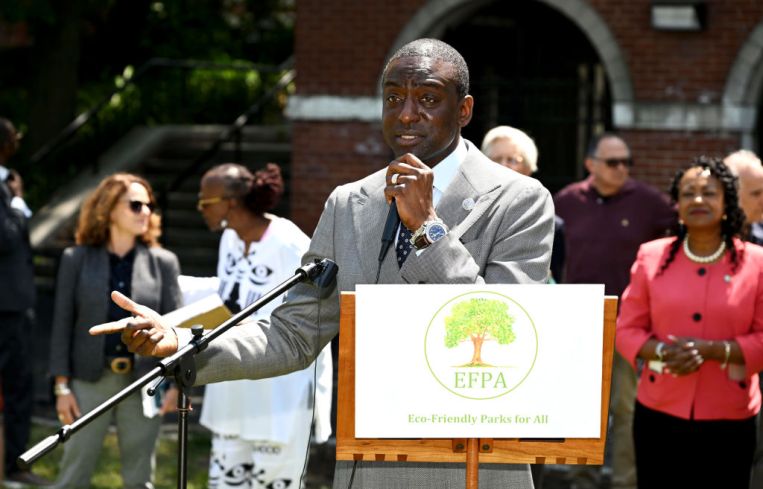Commercial Real Estate Gets Some Good News in City Council Primary
By Aaron Short June 28, 2023 5:09 pm
reprints
Two of the biggest impediments to real estate development in the New York City Council will be out of office next year.
Yusef Salaam, a member of the exonerated Central Park Five, declared victory in his Harlem council race after capturing more than 50 percent of the vote with 95 percent of ballots tallied.
The district’s incumbent, Kristin Richardson Jordan, backed out of the race in May after less than two years in office, narrowing the contest down to Salaam and two veteran New York State Assembly members, Inez Dickens and Al Taylor.
Salaam said he appealed to voters because he was not a “seasoned politician.”
“This campaign has been about those who have been counted out. This campaign has been about those who have been forgotten,” Salaam said Tuesday at his election-night party at Harlem Tavern.“This campaign has been about our Harlem community, who has been pushed into the margins of life. And made to believe that they were supposed to be there.”
An even bigger upset occurred in east Brooklyn, where veteran Democrat and former Black Panther Charles Barron appeared to lose his Council seat to Chris Banks, a community activist, who was ahead by about 400 votes with 95 percent of ballots tallied.
Banks had run against Barron and his wife, Inez Barron, who have represented East New York, Brooklyn, in public office for two decades, in three different races for the City Council and State Assembly between 2012 and 2014. This time, Banks scored endorsements from U.S. House Minority Leader Hakeem Jeffries and several organized labor groups, which independently spent $175,000 to support his campaign to oust the far-left incumbent.
Barron alienated labor leaders by opposing a move to switch retired public workers from Medicare to Aetna’s Medicare Advantage insurance plan, while Banks’s pro-union stances encouraged a coalition of unions including the Hotel Trades Council, DC 37 municipal workers, and 32BJ SEIU building workers to invest in him.
“You have a candidate like Chris Banks who is clearly pro-labor and demonstrated a willingness to work with the speaker of the City Council, largely unlike the recent and lengthy tenure of Charles Barron,” said Austin Shafran, founder of Green Book Strategies who worked with the Hotel Trades Council. “Chris was part of an extensive screening process and he stood out as extremely pro-union and pro-worker.”
Both incumbents identified as Democratic Socialists and sought to block mixed-use housing in their districts. Jordan opposed developer Bruce Teitelbaum’s $700 million proposal to build two 31-story towers with 915 units on West 145th Street by demanding greater levels of affordability for below-market units. Teitelbaum pulled his rezoning proposal “One45” before a Council subcommittee vote last year and converted it to a truck depot, but said in February he wanted to give the plan another try.
He’ll likely have a more receptive ear from Salaam, who told Patch in March he would support the One45 project because the neighborhood needed more affordable housing.
“There’s no world in which I would have walked away from the previous One45 project without bringing desperately needed truly affordable units to Harlem,” he said.
Real estate leaders believe the project will come back.
Barron sought to stymie the city’s rezoning of East New York in 2015 and encouraged community members to reject any developer’s projects that set aside fewer than half of their units for low-income residents. Last fall, Barron backed the Innovative Urban Village plan, which includes 11 buildings with 2,000 apartments, after negotiating with the developer to lower the upper end of the units’ income limits to 80 percent of the area’s median income.
During his campaign, Banks emphasized building high-quality affordable housing without displacing residents who have lived in East Brooklyn for generations.
“We must be smart on how we move forward,” Banks wrote in an op-ed for East New York News. “Longtime hard-working residents who have worked and retired while living in the community should not be forced out during the time of progress.”
Brooklyn political operatives believe the community was simply ready for a change after Barrons’s 20 years in office.
“Charles was very intelligent and engaging, but at the end of the day his constituents realized he wasn’t effective and he played the role of prophet well,” said Ken Fisher, a member of the Business Law Department at Cozen O’Connor and a former Council member who served with Barron. “People came to realize over time that the world had changed and he hadn’t.”



